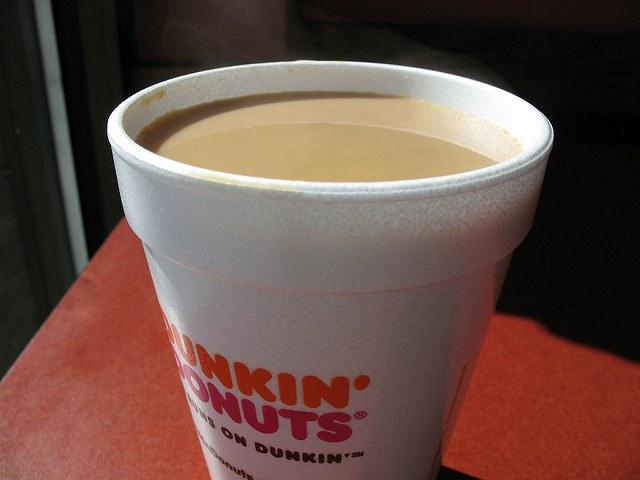
Six years ago Dunkin’ Brands, the parent company of Dunkin’ Donuts and Baskin-Robbins, promised its stakeholders that finding an alternative to foam cups was the company’s “No. 1 sustainability priority.”
But most Dunkin’ locations are still serving up java in cups made from polystyrene (more commonly known as Styrofoam, a registered trademark of Dow Chemical), Emily Cohn of Business Insider reported this week. Furthermore, even though other fast food chains have transitioned away from foam packaging over stakeholders’ concerns about environmental impact, Dunkin' has made it clear it sees no urgency in finding an alternative.
The company announced yet again in 2014 that it would end the use of polystyrene after research suggested the packaging material could be linked to cancer. Those messages were repeated again last year, but Dunkin’ is carrying on as if it is business as usual.
Other food companies switched to alternatives such as paper cups. Although paper is an imperfect solution, it's an incremental improvement over a material that, depending on the source cited, takes anywhere from several decades to several centuries to decompose. Food companies had long responded to those complaints by making their case that polystyrene was the most sanitary single-use option in which to serve food and beverages.
Some of Dunkin’s competitors, however, made the switch without causing angst within their consumer base. In the late 1980s, several environmental groups led the charge against McDonald’s for its use of foam packaging for hamburgers and other food products. The fast food giant eventually worked with the Environmental Defense Fund to find a solution, which is why your Big Macs are served in a cardboard box today. Back then, the polystyrene industry complained about the company’s 1990 decision to cease the use of foam packaging, and insisted a recycling system could fix that waste problem. But almost three decades later, polystyrene recycling still has not proven to be scalable or economically feasible.
And earlier this decade, after McDonald’s solved some of its then-doldrums by reinvigorating its coffee options – therefore increasing its consumption of Styrofoam cups – the company decided in 2013 to replace polystyrene with a paper-based alternative.
Of course, whether fast food companies use foam, paper or plant-based plastic, there is still the pesky challenge of waste diversion, as most of this material enters landfills instead of recycling centers. Do not expect this problem to change for the better any time soon, as the low cost of fossil fuels moved manufacturers to use virgin materials instead of recycled feedstock.
On that point, several years ago the veteran sustainability writer Marc Gunther made a behavioral economic argument for companies like Starbucks to change their pricing approach. Instead of knocking the price of a beverage by a dime or so for customers who bring their own cups, Gunther suggested that companies charge an extra for a single-use container. The price would be the same, Gunther insisted, but human psychology would nudge consumers to bring their own reusable container more often. Much like bans or fees on plastic shopping bags convinces more shoppers to bring their own bags to the supermarket, a different approach toward how we serve that morning coffee or afternoon decaf could start making a difference.
But for now, environmental groups are making the case that polystyrene has got to go.
Dunkin’ Brands has an opportunity to enact more change and persuade more food companies to take on similar policies. In recent years, the company moved toward sourcing only sustainable palm oil and humanely-produced meat and eggs. After a shareholder proposal urged the company to eliminate nanomaterials such as titanium dioxide, Dunkin' removed them from its products. The company also proved to be open to other waste reduction measures, such as a pilot program that used bio-digesters at a few locations. Taking a stand on single-use containers would prove to stakeholders that Dunkin’ Brands is serious about being a responsible corporate citizen.
Image credit: Mr.TinDC/Flickr

Leon Kaye has written for 3p since 2010 and become executive editor in 2018. His previous work includes writing for the Guardian as well as other online and print publications. In addition, he's worked in sales executive roles within technology and financial research companies, as well as for a public relations firm, for which he consulted with one of the globe’s leading sustainability initiatives. Currently living in Central California, he’s traveled to 70-plus countries and has lived and worked in South Korea, the United Arab Emirates and Uruguay.
Leon’s an alum of Fresno State, the University of Maryland, Baltimore County and the University of Southern California's Marshall Business School. He enjoys traveling abroad as well as exploring California’s Central Coast and the Sierra Nevadas.














